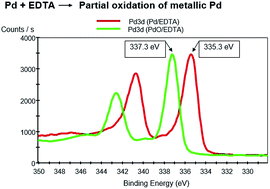The influence of ethylenediamine tetra acetic acid (EDTA) on the transformation and solubility of metallic palladium and palladium(ii) oxide in the environment
Abstract
The environmental occurrence of elevated concentrations of platinum (Pt), palladium (Pd) and rhodium (Rh) from automotive catalytic converters has been well-documented. Limited information exists regarding their chemical behavior post-emission, however, especially in the presence of commonly occurring complexing agents. The purpose of this study is to examine the influence of ethylenediamine tetra acetic acid (EDTA) on the possible environmental transformation and solubility of Pd by conducting batch experiments using metallic palladium (Pd black) and palladium(II) oxide (PdO). Changes in the particle surface chemistry of treated samples were analyzed using X-ray Photoelectron Spectroscopy (XPS) and Transition Electron Microscopy/Energy Dispersive X-ray Spectrometry (TEM/EDX) techniques. Metallic palladium was partially transformed into PdOx (x < 1), while PdO remained largely unaffected. The pH of EDTA solutions was observed to modulate Pd solubility, with Pd black demonstrating a higher solubility compared to PdO. Solubility was also found to increase with a corresponding increase in the strength of EDTA solution concentrations, as well as with the length of extraction time. The overall solubility of Pd remained relatively low for most samples (<1 wt%). A dissolution rate of 2.01 ± 0.17 nmol m−2 h−1 was calculated for Pd black in 0.1 M EDTA (pH 7). In contrast to previously held assumptions about the environmental immobility of Pd, small amounts of this element emitted in metallic form are likely to be soluble in the presence of complexing agents such as EDTA.


 Please wait while we load your content...
Please wait while we load your content...